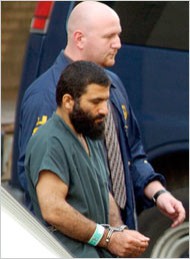|
News Articles
|
From New York Times, March 25, 2008
Convicted Imam Seeks Evidence of Wiretapping
Published: March 25, 2008
By ALAN FEUER, New York TimesLawyers for an Albany imam convicted of supporting terrorism in an F.B.I. sting operation asked a federal appeals court on Monday to release parts of a judge’s secret order in the case — one they say might show that their client was spied on improperly by the National Security Agency.
Tim Roske/Associated PressYassin M. Aref, front, being led from court in 2004.
The case is one of the few criminal cases to challenge the legality of the agency’s spying program, which has been unsuccessfully attacked in civil cases. If the lawyers can prove that the agency illegally spied on the imam, Yassin M. Aref, they will try to persuade the Federal Appeals Court for the Second Circuit to rule that the program was unlawful and thus reverse the conviction.
Mr. Aref and a co-defendant, Mohammed M. Hossain, an Albany pizzeria owner, were first investigated by the Federal Bureau of Investigation in the summer of 2003 after American military forces found Mr. Aref’s name and phone number in a notebook while raiding an enemy camp in Rawah, Iraq. Prompted by the notebook and by records of 14 phone calls between Mr. Aref and a number in Damascus, Syria, the government used an undercover informant to approach the two men with a fictitious plot involving shoulder-launched missiles and the assassination of a Pakistani diplomat in New York.
The men were eventually found guilty of agreeing to help launder money for the fake operation. Last March, they were each sentenced to 15 years in prison.
Yet even before the trial began, the defense lawyers asked the government for information about National Security Agency surveillance of their clients, which was first revealed in an article in The New York Times in early 2006. In March 2006, the government responded to one of their requests with a classified filing that even the lawyers, who had security clearances, were not allowed to see. That same day, Judge Thomas J. McAvoy, of the Northern District of New York, denied the defense request in a classified order.
It is that order that the lawyers are seeking to make public. The effort was led by Corey Stoughton, a lawyer for the New York Civil Liberties Union, which has filed court papers in support of the men.
Ms. Stoughton told the appeals court that at the very least, the legal rationale for keeping the order secret should not be kept from the public “behind closed doors.” She asked the judges to order Judge McAvoy to release as much of his ruling as possible — even if that meant issuing an edited version, called a redacted version in legal terms.
William C. Pericak, an assistant United States attorney, told the court that under the law Judge McAvoy did not have to make his reasons public. It was sufficient, he said, for a judge simply to decide that a subject was classified in order to keep it secret.
As it now stands, the case may be the best chance to obtain an appellate ruling on the agency’s program, which monitored the international communications of people in the United States without court approval. Unlike earlier and pending appeals challenging the program, most of them in civil matters, the Aref case draws directly on the substantial constitutional protections afforded to criminal defendants.
Last year, for example, the federal appeals court in Cincinnati dismissed a case challenging the agency’s program, saying that the plaintiffs did not have standing to sue. In November, a federal district judge in Virginia told the government that if it did not allow lawyers for an Islamic scholar sentenced to life in prison for inciting followers to commit acts of terrorism to review classified material on possible wiretapping, she might order a new trial.
The appeals court in New York did not rule on Mr. Aref’s case. No date for a decision has been scheduled.
Updated
March 27, 2008
This site is maintained by Lynne Jackson of Jackson's Computer Services |
